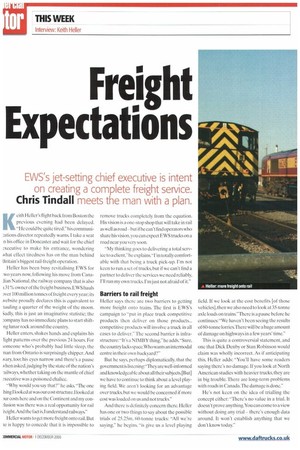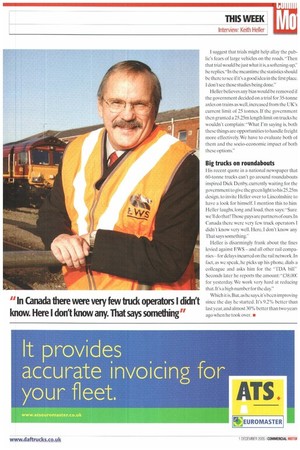Freight Expectations
Page 24

Page 25

If you've noticed an error in this article please click here to report it so we can fix it.
EWS's jet-setting chief executive is intent on creating a complete freight service. Chris Tindall meets the man with a plan.
Keith Hel lc i's flight hack from Boston the previous eN,2ning, had been delayed. "He Qould be quite tired,"hiscommunimtions director repeatedly warns. I take a seat n his office in Doncaster and wait for the chief xeeutive to make his entrance, wondering .hat effect tiredness has on the man behind Britain's biggest rail-freight operation.
Heller has been busy revitalising EWS for wo years now, following his move from CanaIan National. the railway company that is also 131% owner of the freight business. EWS hauls 3ver I 00 million tonnes of freight every year; its ,vebsite proudly declares this is equivalent to -muting a quarter of the weight of the moon. iadly, this is just an imaginative statistic; the :ompany has no immediate plans to start shiftng lunar rock around the country.
Heller enters, shakes hands and explains his light patterns over the previous 24 hours. For ;omeone who's probably had little sleep. the Tian from Ontario is surprisingly ehipper.And xary, too: his eyes narrow and there's a pause when asked,judging by the state of the nation's -ailways, whethe r taking on the mantle of chief .xecutive was a poisoned chalice.
"Why would vou say that?" he asks. -The one hing I looked at wasour cost structure.' looked at mr costs here and on the Continent and my conAusion was there was a real opportunity for rail Yeight.And the fact is,I understand railways."
Heller wants to get more freight onto rail. But ie is happy to concede that it is impossible to
remove trucks completely from the equation. His vision is a one-stop shop that will take in rail as well as roadhut if he can't find operators who share his vision,you can expect EWS trucks on a road near you very soon.
"My thinking goes to delivering a total service to a client," he explains." I'm totally comfortable with that being a truck pick-up. I'm not keen to run a set of trucks, but if we can't find a partner to deliver the services we need reliably, I'll run my own trucksi'm just not afraid of it."
Barriers to rail freight Heller says there are two barriers to getting more freight onto trains. The first is .EWS's campaign to "put in place truck competitive products then deliver on those products... competitive products will involve a truck in all cases to deliver." The second barrier is infrastructure: "It's a NIMBY thing,he adds."Sure, the country lacks space.Who wants an intermodal centre in their own backyard'?"
But he says, perhaps diplomatically, that the government is listening:"They are well-informed and knowledgeable about all their subjects. [But] we have to continue to think about a level playing field. We aren't looking for an advantage over trucks, but we would be concerned if more cost was loaded on us and not trucks.
And there is definitely concern there. Heller has one or two things to say about the possible trials of 25.25m. 60-tonne trucks: "All we're saying," he begins. "is give us a level playing field. If we look at the cost benefits [of those vehicles], then we also need to look at 35-tonne axle loads on trains."There is a pause before he continues:" We haven't been seeing the results of 60-tonne lorries.There will be a huge amount of damage on highways in a few years' time.
This is quite a controversial statement, and one that Dick Denby or Stan Robinson would claim was wholly incorrect. As if anticipating this, Heller adds: "You'll have some readers saying there's no damage. If you look at North American studies with heavier trucks, they are in big trouble. There are long-term problems with roads in Canada.The damage is done."
He's not keen on the idea of trialling the concept either: "There's no value in a trial. It doesn't prove anything.You can come to a view without doing any trial there's enough data around. It won't establish anything that we don't know today." I suggest that trials might help allay the public's fears of large vehicles on the roads. "Then that trial would be just what it is, a softening-up,' he replies."In the meantime the statistics should be there to see if it's a good idea in the first place. I don't see those studies being done."
Heller believes any bias would be removed if the government decided on a trial for 35-tonne axles on trains as well, increased from the UK's current limit of 25 tonnes. If the government then granted a 25.25m length limit on trucks he wouldn't complain: "What I'm saying is. both these things are opportunities to handle freight more effectively. We have to evaluate both of them and the socio-economic impact of both these options."
Big trucks on roundabouts
His recent quote in a national newspaper that 60-tonne trucks can't go around roundabouts inspired Dick Denby, currently waiting for the government to give the green light to his 25.25m desigm to invite Heller over to Lincolnshire to have a look for himself. I mention this to him. Heller laughs. long and loud, then says: "Sure. we'll do that! Those guys are partners of ours. In Canada there were very few truck operators I didn't know very well. Here, I don't know any That says something."
Heller is disarmingly frank about the fines levied against EWS and all other rail companies— for delays incurred on the rail network. In fact, as we speak, he picks up his phone. dials a colleague and asks him for the "'FDA Seconds later he reports the amount: "f2.38,00C for vesterday. We work very hard at reducing that. It's a high number for the day."
Which it is. But.as he says.it's been improving since the day he started. It's 9.2% better than last year,and almost 30% better than two years ago when he took over. •


































































































































































































